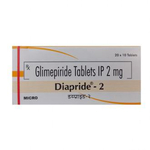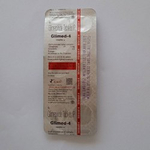glynova
Introduction to glynova
Glynova is a medication primarily used to help manage blood sugar levels in individuals with type 2 diabetes. It is often prescribed when diet, exercise, and other medications are not sufficient to control blood sugar levels effectively.
Composition of glynova
Glynova contains the active ingredient Glimepiride, which is a type of medication known as a sulfonylurea. This ingredient plays a crucial role in helping the body manage blood sugar levels.
Uses of glynova
- Helps manage blood sugar levels in type 2 diabetes.
- Used when diet and exercise alone are not enough.
- Can be combined with other diabetes medications for better control.
Side effects of glynova
Common side effects:
- Low blood sugar (hypoglycemia)
- Dizziness
- Headache
- Nausea
- Weight gain
- Mild stomach discomfort
Serious side effects:
- Severe low blood sugar
- Allergic reactions
- Liver disorders
- Blood disorders
Precautions of glynova
Glynova should not be used by individuals with type 1 diabetes, diabetic ketoacidosis, or those who have had severe allergic reactions to sulfonylureas. It should be used with caution in people prone to low blood sugar and during stressful situations like surgery or illness. Always consult a doctor before starting glynova.
How to Take glynova
- Start with a dose of 1 to 2 mg once daily.
- Take it with the first meal of the day.
- The dose can be gradually increased up to a maximum of 8 mg per day.
- Follow your doctor's instructions regarding dosage adjustments.
Conclusion of glynova
Glynova is an effective medication for managing blood sugar levels in individuals with type 2 diabetes. It works by stimulating the pancreas to release more insulin and improving the body's response to insulin. However, it is important to use it under medical supervision and be aware of potential side effects and precautions.
Similar Medicines
Available in 2 variations

Glynova 4mg Tablet
Glynova 4mg Tablet
strip of 10 tablets

Glynova 2mg Tablet
Glynova 2mg Tablet
strip of 10 tablets
Related Posts

1:15
5 Healthier Sugar Alternatives!

1:15
Pregnancy and Diabetes: What to Eat? | Foods to Eat for Gestational Diabetes!

1:15
How Can You Naturally Boost Your Child’s Immunity and Keep Them Healthy?

1:15
What Are the Best Foods to Keep Your Kid’s Brain Healthy?

1:15
How Does Vitamin D3 Deficiency Affect Your Body? Shocking Symptoms Revealed!

1:15
Why Is Calcium Important for Kids? Common Deficiency Symptoms You Shouldn’t Ignore!

1:15
How to Increase Your Child’s Weight Naturally? Healthy Diet Tips for Parents!
Disclaimer : This information is not a substitute for medical advice. Consult your healthcare provider before making any changes to your treatment . Do not ignore or delay professional medical advice based on anything you have seen or read on Medwiki.
glynova
Prescription Required
Manufacturer :
Tycoon Pharmaceuticals Pvt LtdComposition :





















.svg)
